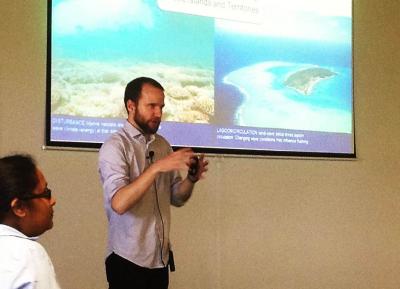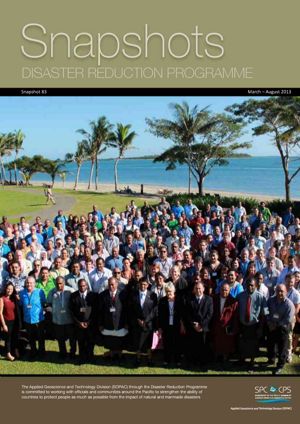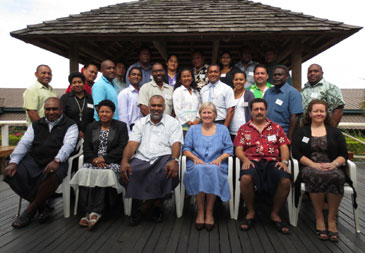Annual Meeting of the SOPAC Division, STAR Network and Circum-Pacific Council, Rarotonga, Cook Islands, 5-11 October 2013
Monday, 23 September 2013 11:19
administrator

Delegations from Pacific governments, along with international donors and prominent scientific organisations will meet in the Cook Islands during the second week of October to investigate and discuss aspects of mineral resources development in the Pacific region.
This will be during the Third meeting of the Secretariat of the Pacific Community's (SPC) Applied Geoscience and Technology Division (SOPAC), whose running theme will be 'Opportunities and challenges of developing natural resources in large ocean states'.
The meeting will be held in conjunction with the 2013 Circum-Pacific Council (CPC) meeting, along with 2013 STAR* (Science, Technology and Resources Network) Session.
Professor Michael Petterson, SOPAC Division Director, expressed his gratitude to the Cook Islands Government for hosting the meetings, and further added that 'As a new Director attending my first Divisional meeting, I am very excited to be able to meet and discuss one of the key aspects of development for the Pacific: sustainably and inclusively developing mineral resources. The advent of Deep Sea Minerals could bring many changes to the Pacific and we all need to prepare and be informed. I will also be presenting my new vision for where I would like to take SOPAC Division during my tenureship. Let us also not forget STAR and the very last year of it's chair, Professor John Collen who has, again, produced a very exciting programme for us to learn from and contribute to. I look forward to seeing everybody and extend a very warm welcome.'
Circum-Pacific Council is an association of earth scientists, engineers, and oceanographers in the Pacific region, while STAR was founded in 1985 to facilitate the continuing provision of advice to SOPAC by the international geoscience community.
The main theme of the STAR Conference is 'Large ocean states: challenges, opportunities and risks in developing non-living marine and onland natural resources', and papers on renewable energy and deep sea minerals will be presented.
For further information, please go to: http://www.sopac.org/index.php/sopac-3
Last Updated on Thursday, 26 September 2013 14:20
Pacific Wave Models Assist In Coastal Adaptation Planning
Friday, 20 September 2013 15:31
administrator

Thursday 19 September 2013, Secretariat of the Pacific Community (SPC), Suva, Fiji – On 19 September, guest lecturer Dr. Tom Durrant of the Australian Bureau of Meteorology presented his wave modelling research to students at USP Marine Science Campus. This new research provides a better understanding of ocean wave movements across the Pacific and will be used by SPC’s Applied Geoscience and Technology (SOPAC) Division to enhance development planning and disaster management in the region.
According to Durrant, “Waves and wave climate have significant implications for coastal security, marine resources, and alternative energy options. Waves on the ocean, Durrant explained, range in period from tidal waves, with periods of 12 and 24 hours, to Tsunamis, with periods around 15 minutes, to wind driven waves with periods of around 2 to 20 seconds.
In the case of wind driven waves, the focus of Durrant's work, the longer the wind blows over a greater area, the bigger the waves. Pacific Islands are affected not only by local, short period, wind-generated waves but also by long period swells generated by far away storms.
Long period swell waves are fast-moving waves caused by distant storms that can pile up when they reach land. Such waves have caused widespread flooding, damage and loss of life in the Pacific, for example, in the Mortlock Islands of Papua New Guinea in 2009 and in the Marshall Islands in 2012. “These events haven’t been studied much because of lack of data,” said Durrant.
To this end, Durrant has been working under the AusAid-funded Pacific and Australia Climate Change Science and Adaptation Planning (PACCSAP) Programme to develop wave models for the Pacific that can in turn be used to assess wave-induced coastal inundation events in detail.
Last Updated on Friday, 20 September 2013 15:39
Read more...
|
Disaster Risk Management and Climate Change Training for SPC staff
Wednesday, 18 September 2013 13:43
administrator

Monday 16 September 2013, Secretariat of the Pacific Community (SPC), Suva, Fiji: Fifty-nine staff members of the Secretariat of the Pacific (SPC) staff have completed disaster risk management (DRM) and climate change training in recent months.
Half-day training sessions were held in Suva (Fiji), Honiara (Solomon Islands), Pohnpei (Federated States of Micronesia) and Noumea (New Caledonia), designed to build staff capacity in areas related to climate change and disaster risk management. It is part of a programme of action to mainstream these issues across all of the divisions of SPC.
Because of their impact on social, economic, market and industry sectors, DRM and climate change are considered ‘cross-cutting’ issues, and SPC is integrating such issues into its programmatic approach to development. This process is referred to as mainstreaming.
SPC is the Pacific region’s principal technical and scientific organisation. Its divisions are involved in research and project implementation in the areas of applied geoscience and technology; public health; fisheries, aquaculture and marine environment; economic development (transport and energy); statistics for development; land resources (agriculture, forestry, land use, animal health, etc.); and education, training and human development.
The training for SPC staff is designed to enable them to better understand DRM and climate change and to factor this professional awareness into personal roles and functions. The training is also designed to enable SPC staff to further contribute to the organisational goal of serving Pacific Island countries and territories (PICTs) by assisting them to mainstream DRM and climate change into national and regional planning processes.
Last Updated on Wednesday, 18 September 2013 13:50
Read more...
Snapshot 83 - Disaster Reduction Programme: March - August 2013
Monday, 16 September 2013 08:00
administrator

We finally turned the corner with our major consultative event for 2013: the Joint Meetingof the Pacific Platform for Disaster Risk Management & Pacific Climate Change Roundtable which was held in Nadi, Fiji from 8th - 11th July, preceded by a series of 5 separate technicalmeetings from 1st - 5th July also in Nadi.
It took us about 8 months to make preparations and I think this paid off - big time!!. A number of participants from around the region and from other parts of the world were pleased to be able to participate and to achieve really good outcomes such as the re- commitment by the region to integration and the articulation of some key areas of challenge and interest which will be used to help shape a strategy for disaster and climate resilient development for the region by 2015.
This is the second issue of Snapshots for 2013 and we have for you a number of interesting stories. We cover some of the results of the meetings in July and also the work that is on going on DRM within our Pacific island countries and territories.
We showcase some of the exciting work being done at the regional level and also work done by our partners whom we are proud to work with.
Last but not least we are now also inviting our partners to contribute to future editions of Snapshots and look forward to receiving updates on their efforts in DRM implementation in the Pacific island countries and territories.
I hope you enjoy this issue.
Mosese Sikivou
Deputy Director
Disaster Reduction Programme
VIEW ONLINE | DOWNLOAD
Last Updated on Monday, 16 September 2013 08:04
|

 News & Media Releases
News & Media Releases








